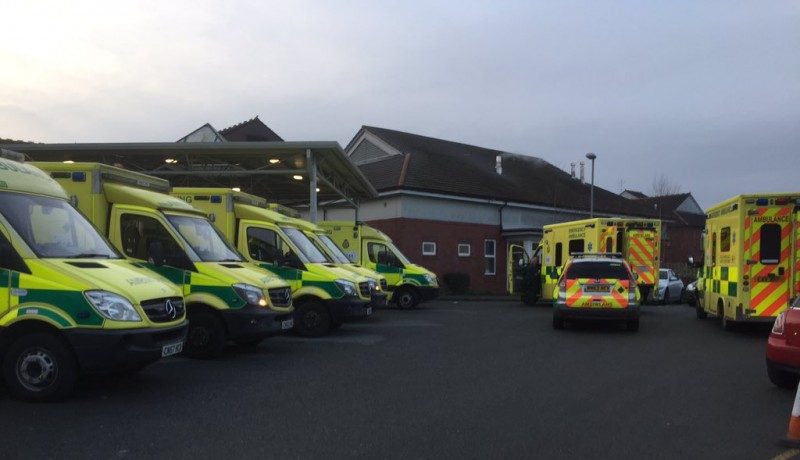Ambulance handover delays in Wales hampering ‘safe and dignified’ care for patients

Handover delays at emergency departments in Wales are hampering the provision of “safe and dignified care” for ambulance patients, a report has found.
Healthcare Inspectorate Wales (HIW) has today published the findings of a review into the impact of people being left queuing outside hospitals in ambulances due to a lack of bed spaces.
It shows that the issue of prolonged delays is a regular occurrence outside emergency departments across the country.
HIW said it was clear that the waits and variations in process are having a “detrimental impact” upon the health system’s ability to support patients.
Despite this, patients were generally positive about their experiences of ambulance crews, particularly regarding their kindness, communication and management of situations.
Alun Jones, interim chief executive of Healthcare Inspectorate Wales, said: “It is clear that the dedication and commitment of the Welsh Ambulance Service and emergency department staff has continued to result in positive patient experiences despite the challenges of the pandemic.
“There is however, significant collaborative work needed to resolve the issue of prolonged handover delays which are a symptom of wider patient flow issues throughout the NHS in Wales.
“It is my expectation that the recommendations that fall from this review are taken forward alongside, and in the context of, other work in this area to achieve the required improvement.”
A total of 9,384 ambulance hours were lost due to handover delays outside emergency departments in north Wales in the three months from April to June this year, according to the Emergency Ambulance Services Committee.
The HIW report shows inspectors contacted all health boards across Wales which provide emergency care.
It notes that only one response was received from Betsi Cadwaladr University Health Board despite north Wales having three emergency departments.
HIW said where reference is made to staff survey comments, it therefore may not be reflective of staff within Betsi Cadwaladr.
It said: “Whilst there are clear expectations and guidance for NHS Wales to follow, and a clear will to meet these guidelines, there are substantial challenges which inhibit efforts to consistently achieve these.
“Whilst handover processes at EDs across Wales were broadly similar, we found many examples of these processes being adapted for a range of reasons including departmental layouts, differences in staff roles and availability of staff.
“We found day to day inconsistencies within the same department and sometimes between clinicians and ED staff as well as a lack of clarity between the Welsh Ambulance Services NHS Trust (WAST) and ED staff about responsibility for a patient until transfer to the ED.
“These types of inconsistency can introduce risk and have a detrimental impact on patient care and safety and therefore requires attention.”
New roles have been introduced by some health boards aimed at improving handover processes.
However, HIW said these roles are not in place across all EDs, and it believes that all health boards should consider the benefits that these roles may bring.
It added: “A significant amount of work is already underway across NHS Wales to tackle these issues.
“However, it is clear that more improvement work is needed between WAST, health boards and Welsh Government to meet these challenges.”
Claire Roche, the Welsh Ambulance Service’s Executive Director of Quality and Nursing, said: “Ambulance crews know better than anyone the impact that delayed handover has on a patient’s experience because they spend many hours – sometimes an entire shift – with the same patient on the back of a vehicle.
“It’s as distressing for our crews as it is for the patient and their loved ones, especially when there are other patients in the community who need our help and we can’t get to them.
“The focus of all of us in NHS Wales should be on patient safety, whether that’s patients on the back of an ambulance outside the Emergency Department or patients in the community where arguably, the risk to their safety is greater because they don’t have an expert clinician by their side.
“Our emergency ambulance service exists to deliver life-saving immediate care and to take patients promptly to hospital for the necessary treatment – being available in the community to respond to people is therefore essential.
“For the Welsh Ambulance Service, this is about getting to the root cause of the issue in order to resolve it, rather than adapting to a situation so that it becomes the new normal.
“We welcome the fact that Healthcare Inspectorate Wales is shining a light on this issue, and we will continue to work with colleagues in health boards and Welsh Government to make improvements.”
Spotted something? Got a story? Email: [email protected]
Latest News
